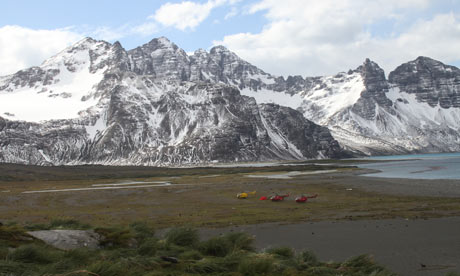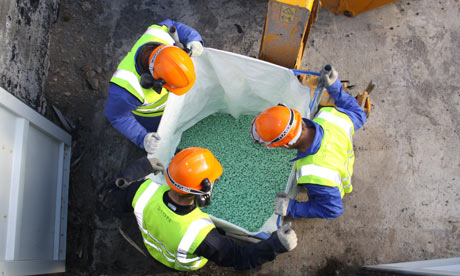
Three helicopters
encountered perilous flying conditions while peppering the southern
Atlantic island with 183 tonnes of the poison Brodifacoum. Photograph:
Roland Gockel
Against the backdrop of an approaching Antarctic winter between February and May, three helicopters encountered perilous flying conditions while peppering the southern Atlantic island with 183 tonnes of the poison Brodifacoum. The team of 25 baited an area of 224 sq miles (580 sq km). The area targeted dwarfed the previous largest rodent eradication, on New Zealand's Campbell Island, by five times.
The project director, Prof Tony Martin, said the team, managed by the Dundee-based South Georgia Heritage Trust, aimed to return the 104 mile (167 km) long island to the millions of seabirds wiped out by rats and mice introduced by 19th- and 20th-century whalers and sealers.
"South Georgia, before man came along, was probably the most important bird breeding island in the world. And it is no longer anything close to that," he said. Probably less than 1% of the original population of burrowing seabirds remains, Martin said.
Many of the island's animals remain unaffected by the rat population. Huge populations of seals and penguins attract thousands of cruise ship passengers every year.

Rat eradication bait in the reloading bag. Photograph: Tony Martin/guardian.co.uk
However Martin said others, such as the endemic South Georgia pippit and South Georgia pintail, were clinging to existence "by their claws". The storm petrel, Antarctic prion and cape petrel had been driven away from the vital breeding grounds. Every breeding season a single rat would eat hundreds of seabird chicks.
He said that returning the island's habitat to its natural inhabitants was an act of global significance and that islands like South Georgia were particularly vulnerable to introduced predators.
"What we are doing is allowing an island to go back to the way it was before man came along and screwed it up two and a half centuries ago. Invasive animals are really crucifying the world's biodiversity.
"What you have to bear in mind is the ecosystem of South Georgia evolved in the absence of any terrestrial mammals. So when man came along at the last second of the last hour in evolutionary terms, and introduced these little furry rodents which started to eat them, they were completely naive."
The successful poison drops marked the second phase of a three stage project.
The first stage, which was itself equal in scale to the Campbell Island elimination, took place in 2011. The South Georgia heritage trustee Howard Pearce said it appeared this phase had been successful, lending confidence to the ongoing efforts of the team.
Read More Here
***********************************************************************









No comments:
Post a Comment
Hello and thank you for visiting my blog. Please share your thoughts and leave a comment :)